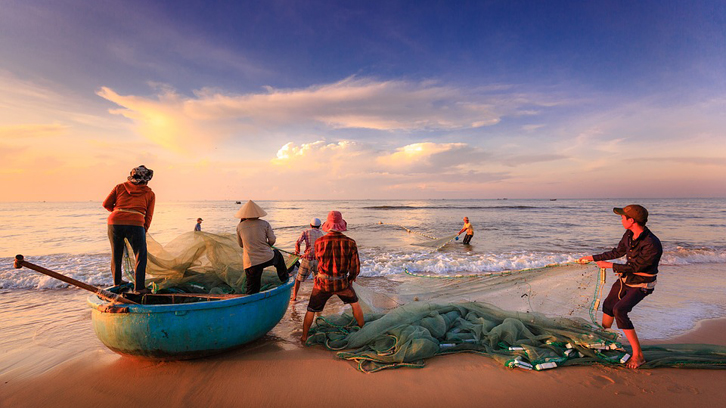Co-managed small-scale fisheries lead to social and ecological improvements

The co-management of small-scale fisheries by the fishermen themselves and the government leads to better ecological and social outcomes than the current centralized management model by governments. This is the result of a study carried out by researchers from the Institute of Environmental Science and Technology of the Universitat Autònoma de Barcelona (ICTA-UAB) which shows the advantages of this management model, but also points out possible improvements.
Small-scale fisheries are an important source of livelihoods for many coastal communities, but they are facing growing threats such as overfishing, competition with industrial fleets, water pollution and destruction of fish habitats. As a response to these threats, the co-management of this type of fisheries is increasingly gaining support as an alternative to centralized management, in which governments manage natural resources collaboratively with local users and other stakeholders, such as researchers and NGOs.
The study, published in the journal Global Environmental Change, highlights that when small-scale fishing communities participate in decision-making processes, it increases the abundance and habitat of the species, as well as fish catches, actors’ participation and the fishery’s adaptive capacity, inducing processes of social learning. "Artisanal fisheries do not carry the same weight as industrial fisheries in terms of global economic data, but the real economic value for families is immense," says ICTA-UAB researcher Laia d'Armengol, who points out that "the management model of industrial fisheries is not applicable to artisanal fisheries because the dynamics are different".
The study carried out a systematic review of the scientific literature in order to evaluate the results obtained by co-managed small-scale fisheries and to analyse which variables affect those results. For this, the framework of analysis of the social-ecological system by E. Ostrom was adapted with specific variables of the artisanal fisheries and of the adaptive management, in order to understand how the context and the fisheries’ characteristics influence the 91 co-management cases analysed.
According to the results, the co-managed fisheries are usually coastal, multi-species and do not have property rights, which are defined and clarified during the co-management process. A legal and institutional framework, as well as a context of decentralization of natural resources, enables the emergence of co-management. Most co-management initiatives are very recent, less than 10 years old, and have an organization that leads and facilitates the process. In most cases, government and users have the same decision power, or users are more empowered and half of them include additional organizations. Most of the initiatives analysed have adopted one or more adaptive management characteristics.
Co-management has mostly positive social and ecological outcomes. A total of 76% of the reviewed cases indicate positive results, while 17% indicate mixed results and 7% negative results. In the ecological field, co-management contributes to a greater abundance and habitats of the species. At the social level, co-management contributes to greater social participation, better congruence between management standards and local conditions, and compliance with standards, and induces social learning processes. Co-management also has an economic impact since it increases catches and incomes from fishing. Lastly, the adaptive capacity of the fishery is increased, that is, the fishery is better prepared to withstand unforeseen events and social and ecological changes.
The most important characteristic favouring the success of co-management initiatives is social diversity, involving a diversity of actors that represents all existing interests. Likewise, involving actors with different socio-economic levels favours the improvement of compliance with rules. The presence of industrial fishing is associated with negative impacts on fish stocks and less cooperation between actors. On the contrary, when there is a presence of artisanal fishing, the legitimacy of the rules increases. When illegal fishing is present, co-management improves the ecological condition of the fishery. Finally, an adaptive management approach increases the adaptive capacity of the fishery, prevents conflicts from growing and prevents new conflicts from emerging.
The results indicate that it is necessary to promote co-management initiatives fostering social diversity, with participating organizations that represent different interests and socio-economic levels. These organizations should adopt adaptive management practices, such as the integration of different knowledge systems, institutional flexibility that allow quick responses to environmental change or experimental and innovative practices. If industrial fishers participate in fishery, they should be involved in co-management decision making in order to ensure their performance under the same governance mechanism and regulation than small-scale fishermen.
The reviewed case studies rarely analyse the co-management impact on new or existing social conflicts, power inequalities and equity. However, studies that do examine these issues suggest that conflicts and power inequalities are reduced only when co-management replaces a previous system of centralized government management and not when it replaces community management schemes. According to the researchers, it is a priority that future research on artisanal fisheries analyse the impact of co-management on conflicts, power asymmetries and equity, and investigate the effect of replacing centralized or community management systems.
Universitat Autònoma de Barcelona (UAB)
References
D’Armengol L., Prieto Castillo M., Ruiz-Mallén I., Corbera E. (2018). A systematic review of co-managed small-scale fisheries: Social diversity and adaptive management improve outcomes. Global Environmental Change. https://doi.org/10.1016/j.gloenvcha.2018.07.009

